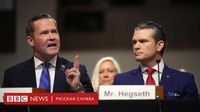The American publication Atlantic has stirred controversy with its recent article featuring screenshots from a Signal chat involving U.S. officials, including Secretary of Defense Pete Hegseth. The screenshots reveal messages detailing military operations against Houthi positions in Yemen, raising eyebrows about operational security and the implications of sharing sensitive information.
On March 15, 2025, just 31 minutes before U.S. military aircraft were scheduled to take off, Hegseth shared specific details regarding the planned attacks, which included F-18 fighters, drones, and Tomahawk missiles. Traditionally, Atlantic refrains from publishing specifics on American military operations to protect U.S. soldiers, focusing instead on the nature of the information being shared. However, the publication felt compelled to release the chat messages after numerous claims from administration officials suggested that they were misrepresenting the contents of the Signal chat.
Following President Donald Trump's assertion that the information was not classified, Atlantic sought clarification from the White House regarding the publication of the full chat. White House Press Secretary Carolyne Levitt responded that while there was no classified information, the administration did not approve of the publication due to the sensitive nature of the discussions.
Levitt also highlighted a significant change in the article's framing, noting that the new headline referred to "attack plans" rather than "military plans," suggesting that Atlantic had conceded a mistake from its previous article titled "Trump Administration Accidentally Sent Me Messages About Its Military Plans." She characterized the entire situation as a fabrication by Trump critics, known for sensational claims.
In a fiery response to the publication, Trump labeled Atlantic a "disgraceful magazine" and referred to its editor-in-chief, Jeffrey Goldberg, as a "total sleazebag." When asked about the inclusion of a journalist in the confidential chat, Trump pointed fingers at his national security adviser, Mike Woltz, stating that he bore responsibility for adding the reporter to the group.
Woltz later confirmed his accountability, while other chat members, including Secretary of State Marco Rubio and CIA Director Tulsi Gabbard, called the journalist's inclusion a "serious mistake." Despite the uproar, Trump defended Hegseth, asserting that he was doing a great job and that the leak through Signal was not a concern for him.
On March 24, 2025, Goldberg revealed that he had been accidentally added to a closed chat of high-ranking U.S. officials discussing the Yemen operation. The chat included prominent figures such as Hegseth, Rubio, and Vice President Jay Dee Vance. The White House later confirmed the authenticity of the chat messages but stated that the situation did not pose a national security threat.
However, experts and critics have condemned the incident as a severe breach of security protocols and a potential violation of the Espionage Act. Many have drawn parallels to former Secretary of State Hillary Clinton's use of a private email server for official communications, an issue Trump has vocally criticized in the past.
Hegseth, responding to the allegations, claimed that his messages did not contain any specific names, targets, divisions, or locations, arguing that they could not be classified as military plans. Despite this assertion, CNN sources indicated that the information shared was indeed classified at the time of the conversation.
The fallout from this incident continues to unfold, raising questions about the handling of sensitive information within the Trump administration and the implications of communication practices in high-stakes military operations.
As discussions about operational security and the responsibilities of public officials escalate, the incident serves as a stark reminder of the delicate balance between transparency and national security. The implications of such breaches could resonate far beyond the current administration, potentially influencing public trust in governmental operations.





